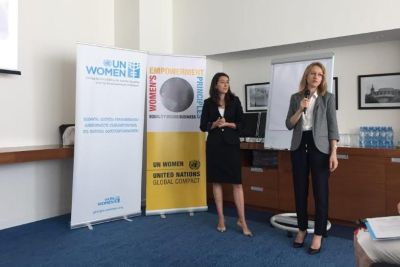How can private business empower women and girls?
Date:
Government officials, representatives of international organizations and of 15 private companies operating in Georgia gathered in Tbilisi to discuss the role of the private sector in accelerating women’s and girls’ empowerment, promoting gender equality and achieving national development goals.

Aydan Olcer, Coca-Cola Global Sustainability Commitments and Stakeholder Communications Manager and Alexandra Akkirman, Public Affairs and Communications Manager presenting Sustainability Strategy of the Coca-Cola Company and Women's Empowerment; Photo: UN Women
Alexandra Akkirman, Coca-Cola Turkey’s Public Affairs and Communications Manager, underlined: “Women represent untapped potential, and we at Coca-Cola believe that we can make a measurable impact by empowering women and girls and, hence, families, communities and society. We also recognize that this can only be done in strong partnerships with governments, communities and development actors.”
The Head of the Human Rights Secretariat of the Government of Georgia, Natalia Jaliashvili, further added: “Working on business and human rights is very important for the Government of Georgia. Currently, the Human Rights Action Plan includes some provisions related to women’s empowerment through the implementation of ‘Women’s Empowerment Principles: Equality Means Business’, but inputs for further improvements from the private sector, development partners and CSOs are welcome, and certainly will be considered while defining objectives in the new action plan.”
UN Women Country Representative Erika Kvapilova reiterated the importance of creating spaces for communication, cooperation and coordination among various stakeholders to ensure progress towards gender equality and the women’s empowerment agenda as an integral part of the 2030 Agenda for Sustainable Development. “The private sector plays a critical role in accelerating progress towards achieving Georgia’s nationalized SDGs. There cannot be significant progress without private-public partnerships, as understood in the broadest sense.”
The meeting was organized by UN Women Georgia Country Offices in cooperation with Coca-Cola Turkey to further promote “Women’s Empowerment Principles: Equality Means Business”, a joint initiative between UN Women and the UN Global Compact.